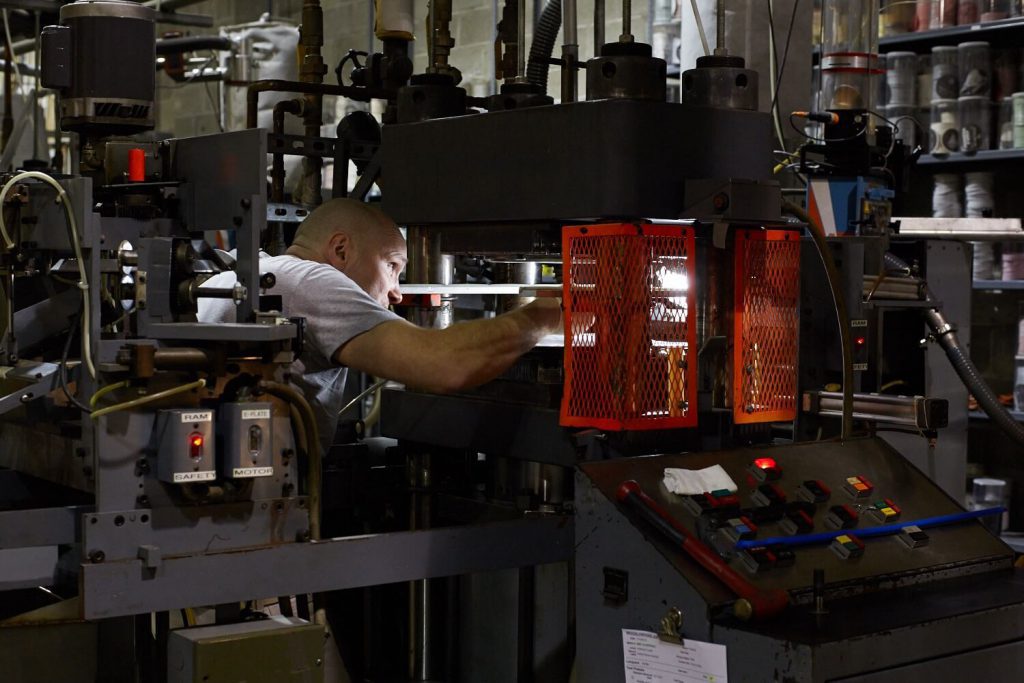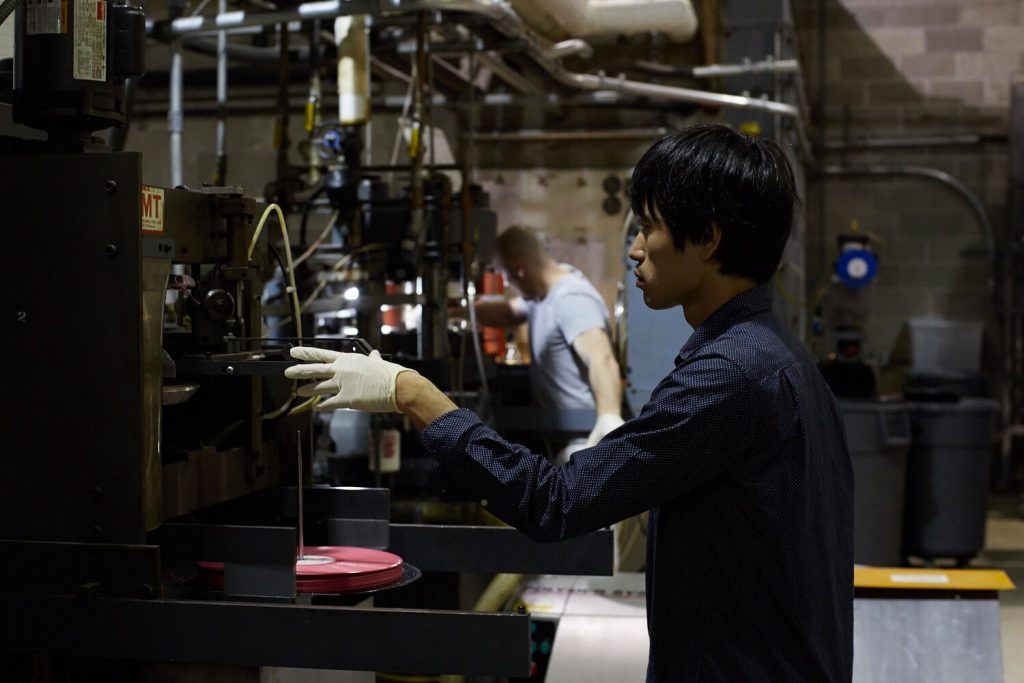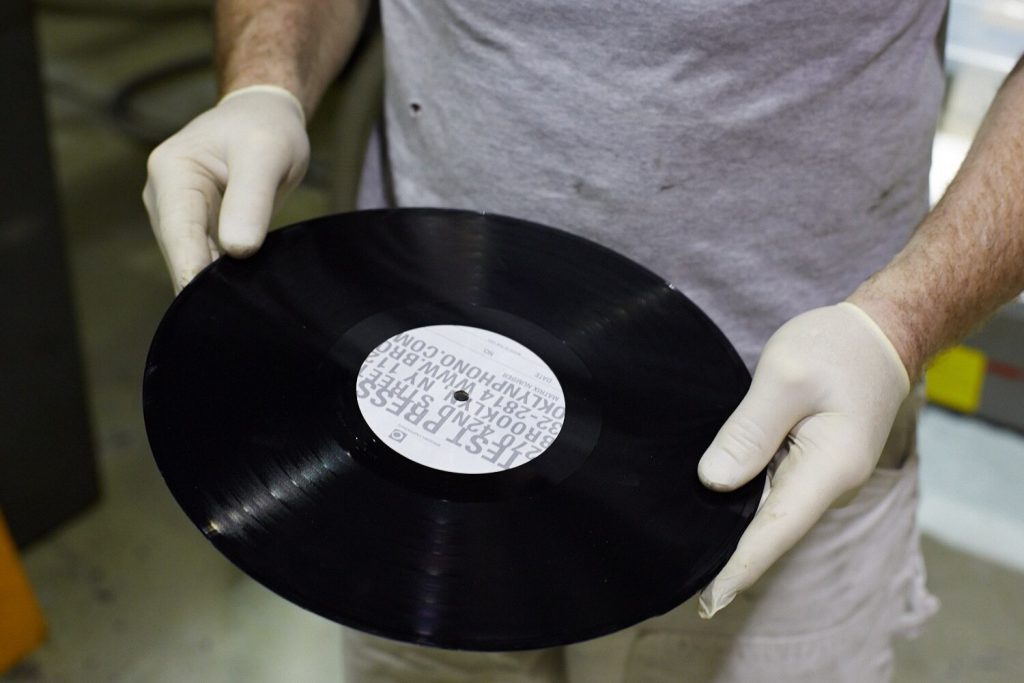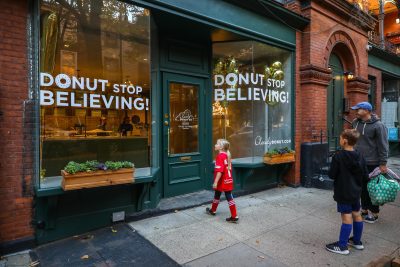Brooklyn Phono: Inside a Family Record Pressing Plant

Photo by Reggie McCafferty
Thomas Bernich fell in love with vinyl at a young age. He grew up in Brooklyn in the ’80s and was mesmerized with rap music as it exploded on the scene. “After school you’d run home and turn the radio on and listen to the traffic channel,” he remembers. “You had Marley Marl on BLS and Red Alert on KISS and the two of them would kind of compete with one another for traffic jams or the mix at the end of the day.”
He began following the different DJs he was discovering and soon found that he had a deep appreciation for the arts of mixing and producing. “The only instrument I learned to play is the stereo,” he explains. “One of the characteristics I always liked about records is the ability to mix two together to create a sound collage. You have this expectation of a song and then, you change it. That change is very exciting, you know?”


Bernich decided he wanted to start pressing records in 2000, but he had little idea of the journey he was about to embark on. He and his partner began soliciting money from family members, and calling around to every record pressing plant in the United States. They secured a building in Sunset Park and, after nearly a year, finally managed to buy two record pressing machines from Erika Records.
“They were old Keiser machines, but they were expired,” Bernich remembers. “They were the equivalent to rotten milk, usually you would just throw them out. But I bought them and I put about a year into them, which is an expensive way of doing business.”
The machines needed to be rebuilt almost entirely, and the process was tedious and costly, but they finally managed to get some production underway. The work was hard and they were putting in long hours at the plant. Before long, Bernich’s partner began to crack under the pressure and told him he was planning to part ways with the company. Bernich continued on alone for the next year, working through trial and error to develop a process that could be both reliable and cost-effective.


In 2003 Bernich, decided to partner up with his wife Fern Vernon Bernich and the entity Brooklyn Phono was born.
“Usually record pressing is family business,” Bernich explains. “Erika Records is a family business, RTI, Rainbow, Archer, and Dynamic Sun when it existed was a family business… You need to be a strong couple, there needs to be a strong foundation to build on the business. Otherwise if it’s just one person, they’re going to break down, they’re going to go mental.”
Unlike the production managers of many other companies, Bernich was building his infrastructure from scratch. The learning curve was incredibly steep and he didn’t have a father in the business to pass down experience and information. Early on, he was lucky enough to become acquainted with Al Miller, the man who was ran production over at Universal Records. Miller invited Bernich up to the plant for a quality control lesson and they kept in touch after that.
“If I had a question I couldn’t resolve, he would discuss it with me,” Bernich recalls. “It’s not that he would answer it for me, because it’s almost impossible to answer anyone’s specific production problem. You have to be there in order to resolve it.”
That wealth of information proved to be invaluable to Bernich in working out the kinks in his own system. “He made a point to me that every day he learned something new. He’d started as an 18-year-old and was at the end of his career. So I was like, ‘Shit, that means that if I do this for 30, 40, or 50 years, every day I’m going to learn something new.’”


Over the next 12 years Bernich would learn plenty. “I’ve learned steam, I’ve learned water, I’ve learned electrical, I’ve learned machining,” he tells me. “I’ve learned hydraulics, I’ve learned material handling, I’ve learned replicating, you know, compression and molding. I’ve learned to keep my mouth shut and just do the record press. I won’t answer the telephone and talk shop with the customers, my wife handles the business side of things. Right now I feel like I have the hang of it, but I’m still finding things. “They still pop up and it’s like, ‘Alright, we have to do all of this differently.’”
When Bernich got into the business, there was little indication of the rebirth vinyl would experience in the years to come. And while he’s certainly grateful for the spike in record sales in recent years, the rebirth hasn’t affected Brooklyn Phono in the dramatic way you might imagine.
“I’m so tunnel-visioned on this little company,” he explains. “So, I can’t exactly say that I understand everyone’s growth or how they do it. As for us, we’ve never stopped. We’ve been process-driven since we started; everything is about making a good record. Each record is a moving target and the growth, having so many different things that you’re doing because of the boom of vinyl, it allows us to become a better at what we do overall.”
Unlike his colleagues at other plants who have gotten so busy that they’ve introduced second and third shifts to keep up with demand, Bernich is more focused on maintaining steady growth and fine-tuning his craft. “We’re trying to get a better product out. We’re a business, so we have to produce. But you don’t want to get caught up in that, getting so busy pushing out these records that you start to make shit.”
Bernich has pressed records for the likes of Grizzly Bear, Magnolia Electric Co., and Terre Thaemlitz, among many others over the years. While humbled by these names, he finds it even more rewarding to watch his clients grow and progress over the years.
“There are records where they started out as a customer and were sleeping on someone’s sofa,” he explained. “They had the dream of making a living off of music. Then that person’s record becomes successful and now they’re making like their fiftieth record and have bought their apartment in Berlin or their house in upstate New York. That’s the sort of person who is particularly exciting to be involved with.”
Regardless of their level of success, it’s Bernich’s understanding of the heart of an artist that helps inform his business decisions.
“I’m not a creature who wants to push out too hard,” he said. “The musician is a hypersensitive person. If they weren’t hypersensitive, they wouldn’t be a musician, they wouldn’t be an artist. You need to have an understanding of that person. If you don’t get that and you don’t put the hypersensitivity into it on the pressing side, then, you won’t be here next week or next year. They need to know that if they go to you, you’re going to take their baby and take care of it.”


You might also like 



















